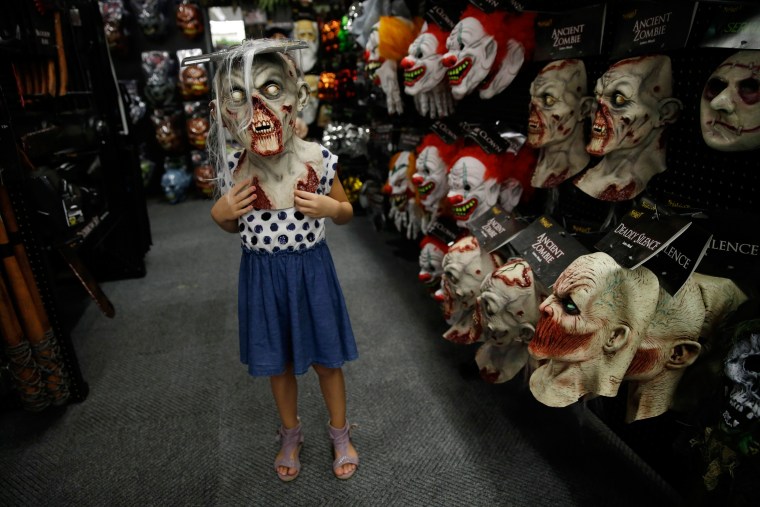Halloween companies are getting spooked by President Donald Trump's trade war with Beijing, with higher tariffs leaving retailers to face a scary choice: jack up their prices, or grit their teeth for lower profits.
“Large retailers are making it clear they don’t want to raise prices,” Michele Buggy, executive director of the Halloween & Costume Association, which represents 50 Halloween manufacturing companies, told NBC News. “They just want the manufacturer to find a way to make it happen.”
Trump and his Chinese counterpart, Xi Jinping, have been locked in a tit-for-tat tariff battle since April last year, when the U.S. hiked duties on imports of steel and aluminum by 25 percent. China then imposed its own punitive tariffs on U.S.-made goods, and Trump responded by taxing $50 billion of Chinese imports. The tiff has since escalated to include tariffs on almost all imported goods from China, with the last tranche due to take effect Dec. 15.
Nearly every round of tariffs has hit the Halloween industry, said Buggy.
Some big-box stores such as Target and Walmart have told investors that they do not currently plan to raise prices for consumers and will work with suppliers to source products from countries outside of China to avoid tariffs. Party City, which opens a fleet of Halloween City pop-up stores, told investors the company is large enough to absorb tariff costs. Party City did not reply to additional requests for comment by NBC News.
Smaller manufacturing businesses, however, face few choices about how to manage the cost of business under the ongoing trade war.
Halloween costume manufacturer Rasta Imposta, whose customers include Walmart and Target, told NBC News it pushed its Chinese factories to speed up production of the company’s most popular costumes — a hot dog and banana — before the latest round of tariffs went into effect on Sept. 1.
“Really it’s just like ‘beat the clock,’” said Robert Berman, CEO of Rasta Imposta. “We’re small, so we’ve built some really nice relationships with trustworthy, quality factories — and we’re not in the position to go find another country to manufacture our costumes.”
Berman said he may sell more on platforms such as Amazon, where he could make a higher profit margin by selling directly to shoppers. Even then, he anticipates he’ll increase prices by a few dollars. A costume that may be priced at $29.99 this year might be $33.99 next year, he said.
“A lot of [our members] are family-owned businesses, and by and large they’re smaller operations,” said Buggy. “This year [the tariffs are] largely being absorbed by the companies, but we don’t know how long they’ll be able to absorb the cost. Soon, the consumers will start seeing the impact.”
U.S. shoppers will spend a total of $8.8 billion this year on Halloween, slightly down from last year's $9 billion, according to the National Retail Federation. About 14 percent of consumers surveyed by the group said their concerns about the economy will impact their Halloween plans.
Small businesses such as Pet Krewe, a New Orleans-based pet costume company, clamored to keep costs low for consumers this year. Allison Albert, founder and CEO, said she couldn’t afford to restock seven of the company’s top-selling pet costumes because it would have cost the company two employee salaries. She estimates those sales would have amounted to $150,000 in additional revenue.
“We’re a small business,” said Albert, whose costumes are sold on Chewy.com and in 700 brick-and-mortar stores, including Petco and Walmart. “We can’t afford this.”
All of Pet Krewe’s costumes are made in China and shipped to the U.S. as finished product. Albert is exploring moving the company’s manufacturing to Vietnam or India, and has even considered using Amish labor (Albert grew up as a Mennonite in rural Pennsylvania).
Cosmetics companies such as Cinema Secrets also anticipate having to increase prices on Halloween character kits and makeup, said Jon Stein, brand director for the company’s Halloween brand, Woochie. About half of Woochie’s Halloween products are sourced from China. The company managed to avoid any price hikes this year, but next year is unpredictable.
No matter which country "wins" the trade war, "At the end of the day it’s us — the business and our customers — who will have to bear the brunt of the tariffs," said Stein.
